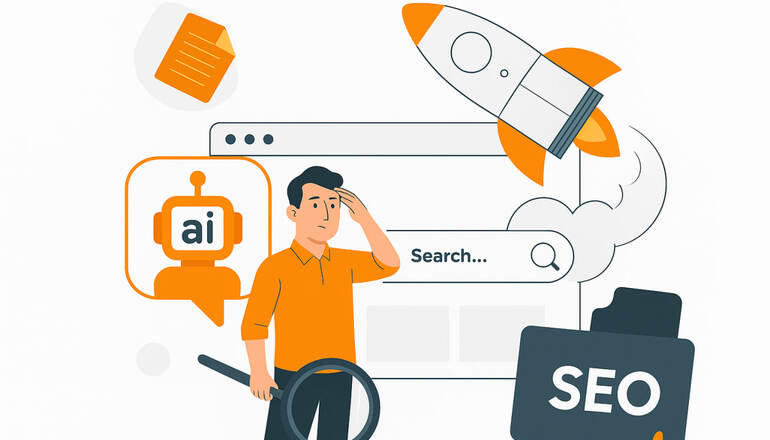
How to Train Your Team to Use AI in SEO
Artificial intelligence has transformed the way businesses approach search engine optimization. But while many organizations rush to adopt new tools, few take the time to properly train their teams to use AI in SEO effectively. Without a clear strategy and the right skills, the promise of AI can quickly turn into wasted resources and missed opportunities.
Introduction
Search engines themselves are evolving rapidly with AI-powered features like Google’s Search Generative Experience (SGE). This means SEO professionals can no longer rely solely on traditional ranking tactics. To stay competitive, companies must integrate AI tools into their workflows—and more importantly, ensure their teams know how to use them.
Training your team to use AI in SEO is not about replacing human expertise with machines. Instead, it’s about enhancing human decision-making, improving efficiency, and scaling SEO efforts. From technical audits to local SEO strategies, AI can streamline processes that previously took hours, allowing marketers to focus on strategy and creativity.
In this guide, we’ll explore how to train your team to use AI in SEO effectively, what skills are essential, and practical steps to implement AI-powered workflows in your organization.
Why Training Your Team to Use AI in SEO Matters
AI is not just a passing trend in digital marketing—it’s the new standard. Here’s why training your team is crucial:
- Increased Efficiency: AI tools can automate repetitive tasks like keyword clustering, content audits, and reporting.
- Data-Driven Insights: Machine learning can analyze vast amounts of data faster than humans.
- Competitive Advantage: Teams that adopt AI early are positioned to outperform competitors still relying on manual methods.
- Adaptability: As Google continues to integrate AI into search results, teams must evolve to keep pace.
Step 1: Build Foundational Knowledge
Before diving into tools, your team needs to understand the basics of how AI intersects with SEO.
Key Concepts to Cover
- Natural Language Processing (NLP): How AI interprets search queries and content relevance.
- Machine Learning Models: Their role in predicting trends, traffic patterns, and user behavior.
- AI in Search Engines: Features like semantic search, AI-generated snippets, and search intent modeling.
When your team grasps these fundamentals, they’ll approach AI not as a magic button, but as a powerful ally that supports strategy.
Step 2: Introduce AI Tools Gradually
Bombarding your team with too many platforms at once can cause confusion. Instead, introduce tools in stages.
Common AI Tools for SEO
- Content optimization platforms that suggest improvements based on top-ranking competitors.
- Technical SEO solutions like automated crawlers that can help identify and AI fix technical SEO issues.
- Local SEO assistants that support keyword research and AI for local business SEO.
- Predictive analytics tools that forecast rankings and traffic performance.
Encourage hands-on practice through workshops where team members apply these tools to real campaigns.
Step 3: Develop AI Literacy Across Roles
Not every team member will use AI the same way. Tailor training based on roles:

For Content Writers
- Learn how to use AI for idea generation, content briefs, and readability analysis.
- Understand AI limitations—like maintaining originality and avoiding repetitive phrasing.
For Technical SEO Specialists
- Use AI crawlers for site audits.
- Train on anomaly detection to quickly identify indexing issues or broken internal links.
For Local SEO Managers
- Explore AI-driven keyword clustering for specific geographic targets.
- Leverage AI insights to improve Google Business Profile optimization.
For SEO Strategists
- Learn how to interpret AI data and apply it to decision-making.
- Focus on balancing AI recommendations with human intuition.
Step 4: Create Standard Operating Procedures (SOPs)
AI tools are only effective when used consistently. Develop SOPs to standardize how your team integrates AI into daily SEO tasks.
Example SOP Elements
- Keyword Research Workflow: Use AI to cluster keywords, then manually validate search intent.
- Content Creation: AI generates outlines, humans refine and expand.
- Technical Audits: AI tools identify issues, but specialists confirm and prioritize fixes.
- Performance Tracking: AI provides predictive models, while strategists align results with business goals.
By documenting processes, you reduce confusion and make training scalable for new hires.
Step 5: Balance AI Automation with Human Creativity
AI is best at processing data and identifying patterns. Humans excel at storytelling, emotional intelligence, and strategic thinking. The most successful SEO teams know where to draw the line.
- AI Strengths: Speed, scale, consistency.
- Human Strengths: Brand voice, empathy, ethical judgment.
For example, AI can suggest headlines, but humans should ensure they resonate with the target audience. AI can highlight keyword gaps, but humans decide which align with business objectives.
Step 6: Foster a Culture of Continuous Learning
AI in SEO is constantly evolving. To keep your team competitive:
- Host regular workshops: Invite experts to share updates on AI trends.
- Encourage experimentation: Allow team members to test new AI features on low-risk projects.
- Share insights openly: Create an internal knowledge base where team members post discoveries and best practices.
The goal is not just to train once but to create a learning culture where the team adapts as AI advances.
Common Mistakes to Avoid When Training Teams
- Relying Too Much on AI: Teams may become overly dependent, ignoring the need for human review.
- Ignoring Ethical Considerations: AI-generated content must be checked for plagiarism, bias, or misinformation.
- Failing to Measure ROI: Without tracking results, it’s hard to prove AI’s value to stakeholders.
- Neglecting Soft Skills: Communication and strategy remain vital, even in an AI-driven SEO landscape.
Measuring the Success of AI in SEO Training
To evaluate whether training is effective, monitor metrics like:
- Reduction in time spent on repetitive tasks.
- Increase in organic traffic from AI-optimized campaigns.
- Improved technical health scores after automated audits.
- Higher content engagement and rankings due to AI-assisted optimization.
Encourage your team to track both quantitative (traffic, rankings) and qualitative (workflow efficiency, job satisfaction) improvements.
Conclusion
Training your team to use AI in SEO is not just a technical upgrade—it’s a strategic investment in your company’s future. By building foundational knowledge, introducing AI tools gradually, tailoring training to roles, and balancing automation with human creativity, you empower your team to work smarter, not harder.
Organizations that embrace AI thoughtfully will streamline processes, improve rankings, and stay ahead in the evolving search landscape. Whether it’s using AI to fix technical SEO issues or leveraging it for local business SEO, the opportunity is clear: those who adapt now will lead tomorrow.
FAQ
-
Do I need technical skills to use AI in SEO?
Not necessarily. Many AI SEO tools are designed for marketers with little technical background. However, having a basic understanding of how search engines work will help your team get better results from AI tools.
-
Can AI replace human SEO specialists?
No. AI can automate tasks like keyword clustering, audits, or reporting, but it cannot fully replace human judgment, creativity, and strategic thinking. The best results come from combining AI efficiency with human expertise.
-
How do I start training my team to use AI in SEO?
Start small. Introduce one or two AI tools that solve clear problems—like content optimization or technical audits—and provide hands-on training sessions. Once your team feels comfortable, expand into more advanced workflows.
-
What are the biggest mistakes teams make with AI in SEO?
The most common mistakes include relying too much on AI without human review, ignoring ethical issues like plagiarism, and not measuring ROI. Training should emphasize balance and accountability.
-
How do I measure if AI training is working for my SEO team?
Track both efficiency and results. For example, measure how much time is saved on keyword research or audits, and compare campaign performance before and after AI integration. Improved rankings, traffic, and engagement are clear signs of success.